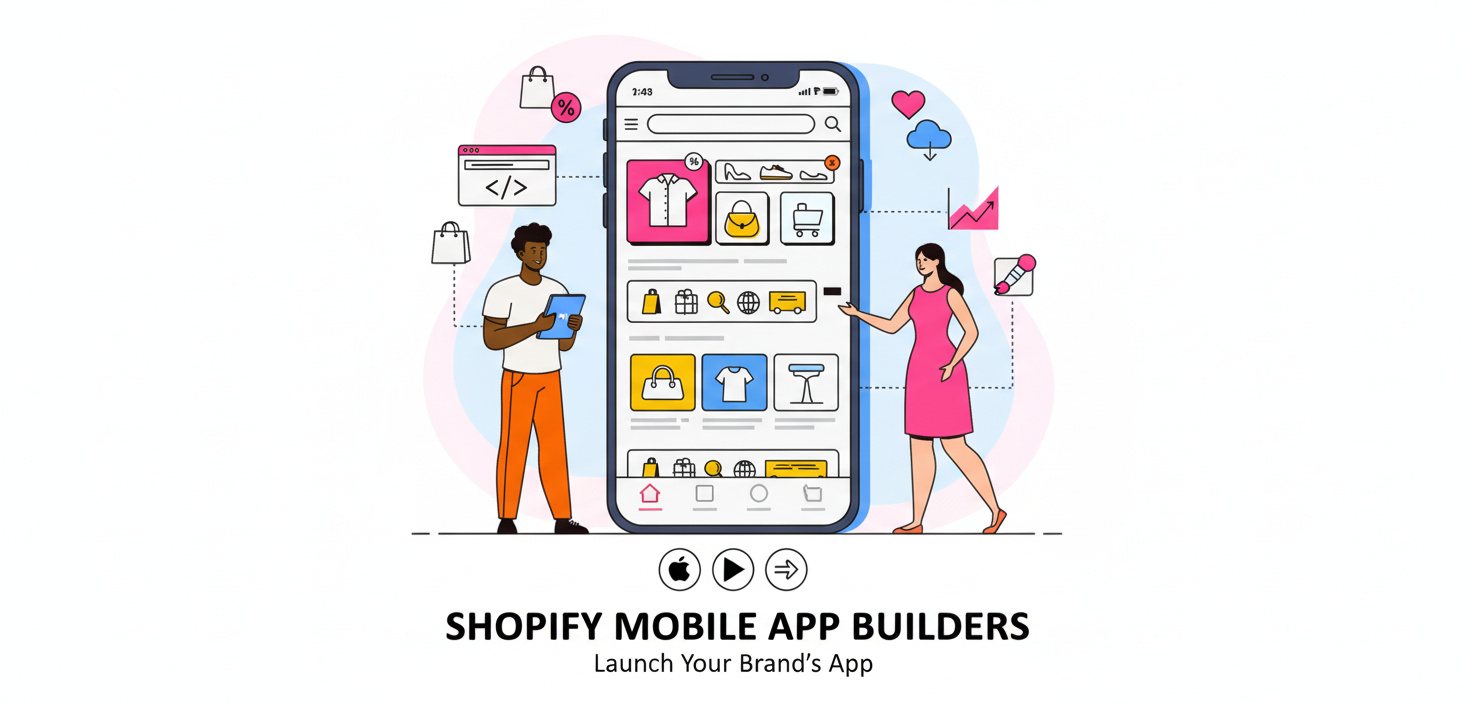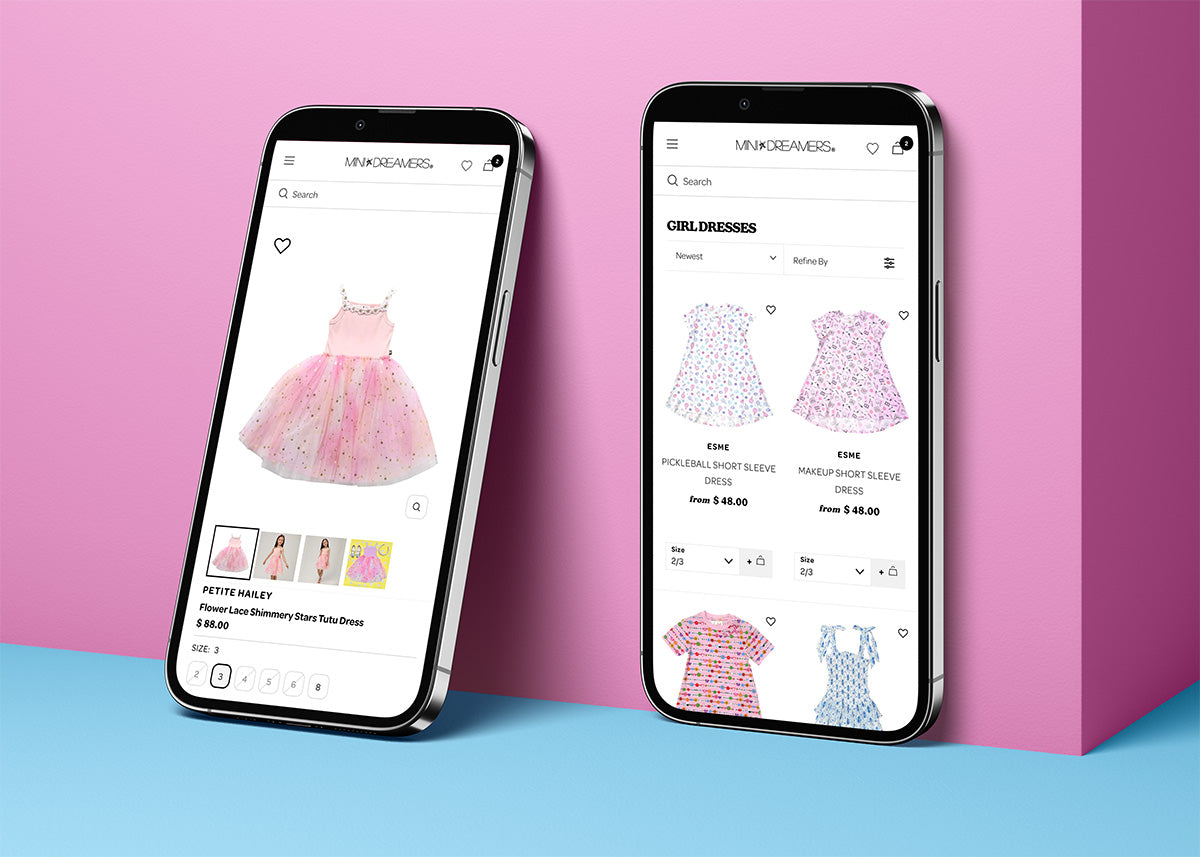Shopify has made it easier than ever for brands to launch and grow online stores. But the ecommerce landscape is changing, and for many stores, just having a website is no longer enough.
Many merchants still miss out on one of the most powerful growth channels: a mobile app.
Just a few years ago, creating an app meant six-figure budgets and teams of developers. Today, thanks to no-code app builders and managed “website-to-app” services, any Shopify brand can launch an app quickly and affordably.
In this guide, we’ll walk through the six best Shopify mobile app builders in 2025. Whether you’re a fast-growing DTC brand looking to build a dedicated VIP channel, or a smaller store exploring entry-level options, you’ll find a solution here that fits your needs, budget, and growth stage.
What Kind of Stores Should Have a Mobile App?
Not every Shopify store needs a mobile app. But the majority of stores with a consistent flow of new customers should be thinking about it.
For the right kind of business, it can be a game-changer. Apps work best when you already have a base of loyal customers who shop with you frequently, or when your products and brand naturally lend themselves to repeat engagement.
Best-suited verticals for mobile apps include:
-
Fashion & Apparel: Frequent new drops, seasonal collections, and a strong brand identity make apps a natural fit.
-
Beauty & Skincare: High repeat purchase rate and loyal communities who respond well to push campaigns.
-
Health & Supplements: Subscription-driven, replenishment-focused products where retention is everything.
-
Lifestyle & Membership Brands: Communities built around exclusivity, loyalty programs, or gated content.
Mobile apps consistently convert better than mobile websites, sometimes by a factor of up to seven, largely because they eliminate distractions and offer a faster and smoother checkout process.
They also boost retention and lifetime value. Customers who download an app tend to become a brand’s VIPs, shopping more often and spending more over time.
Push notifications give brands a direct line to their audience, reaching lock screens instantly rather than getting lost in crowded inboxes or overlooked ads.
On top of that, simply having an app icon on a customer’s home screen keeps the brand visible, creating a constant reminder to come back and shop again.
Why Any Store Can Build Their Own Shopify Mobile App Today
For years, launching a mobile app meant six-figure budgets, long development timelines, and a dedicated, multi-person team required to keep them updated. That put apps out of reach for the majority of Shopify merchants.
That’s no longer the case. Today, you can go from idea to published app in weeks, not months, and at a fraction of the traditional cost.
Instead of hiring developers to rebuild your entire store from scratch, these platforms give you the tools to convert your existing Shopify website into a fully native app, without hiring developers.
Even small and mid-sized brands can now enjoy the same advantages that were once reserved for enterprise-level businesses; higher conversion rates, stronger retention, and a direct communication channel with customers through push notifications.
Put simply, “it’s too expensive” or “we don’t have developers” is no longer a valid reason to skip out on an app.
The Best Shopify Mobile App Builders
1. MobiLoud
At a glance:
-
Years in operation: Founded in 2013 (long track record, trusted by 1000s of brands)
-
Pricing: From ~$299/month + one-time setup and publishing fee
-
What it does: Converts your existing Shopify site into fully native iOS and Android apps
-
Best for: Mid-sized to enterprise brands, Shopify Plus brands, who want full feature parity with their site and minimal extra management
MobiLoud is the best Shopify mobile app builder for brands that want 1:1 consistency with their website and app, and a mobile app channel that requires as little ongoing management as possible.
Unlike other Shopify app builders, instead of making you design and manage a separate app interface, MobiLoud directly converts your existing Shopify store into native apps.
Every feature, integration, and customization from your website carries over to the app. You keep a single codebase, and whenever you update your website, the apps automatically stay in sync.
Your website powers the app, which adds native UI elements and functionality like push notifications, to give a truly native look and feel.
This approach saves a lot of time and effort, and makes the path to ROI a lot easier to see than with other app builders that require more constant attention.
It’s a great fit for brands with a customized, mobile-friendly store, who want their existing UX and all their web optimizations to carry over to their app, all with minimal effort and low overhead.
2. Tapcart
At a glance:
-
Years in operation: Founded in 2017
-
Pricing: From $250/month (Core) up to $1,000/month (Enterprise)
-
What it does: Drag-and-drop app builder with rich design blocks and built-in marketing tools
-
Best for: Design-focused brands that have time and resources to dedicate to building a unique app experience
Tapcart is best known for its polished UI and wide range of design options. With a drag-and-drop editor, brands can create a rich, branded app experience without writing code.
It packs a lot of flashy features: push automations, campaign scheduling, custom blocks, integrations with a number of popular Shopify apps.
If you’re looking for depth of features, it could be a good fit. But consider that more bells and whistles means more work to build and maintain. You may find that the overhead of a Tapcart app cuts into your ROI.
3. Appbrew
At a glance:
-
Years in operation: Founded in 2022 (newer but growing quickly)
-
Pricing: From $999/month (Pro), with custom enterprise plans
-
What it does: Full-featured app builder with a focus on customization and dedicated customer success
-
Best for: Mid-market and enterprise brands looking for a white-glove solution and willing to pay a premium
Appbrew positions itself as a premium option for Shopify merchants who want a bespoke app experience.
Their platform supports deep customization and gives brands the ability to create highly polished, performance-optimized mobile apps. They also offer dedicated support and hands-on collaboration to help merchants maximize their apps’ impact.
The trade-off is cost and complexity. With pricing starting near $1,000/month, Appbrew is certainly more expensive than most alternatives, and the level of customization requires more ongoing coordination and effort.
It’s best suited for brands that plan to make the mobile app their primary sales channel, thus justifying the higher investment and overhead.
4. Shopney
At a glance:
-
Years in operation: Founded in 2019
-
Pricing: From $149/month (Silver) up to $599/month (Platinum)
-
What it does: Drag-and-drop Shopify app builder with templates, push notifications, and live chat
-
Best for: Small to mid-sized stores looking for a budget-friendly, simple solution
Shopney has carved out a niche as one of the most affordable and accessible Shopify app builders.
With pre-built templates, built-in push notifications, and easy-to-use tools, it allows merchants to quickly launch a functional app without needing technical skills. Their customer support is solid, and many smaller merchants highlight how simple it is to get up and running.
That said, Shopney’s templated approach comes with limits. Larger brands or those with complex site setups may find it restrictive, as customization options and integrations are more limited compared to premium platforms.
Shopney is a great entry-level option, particularly for small to mid-sized brands that want a straightforward way to test the waters with a mobile app.
5. Plobal Apps
At a glance:
-
Years in operation: Founded in 2016
-
Pricing: Starter “free to install” plan with 3% success fee; paid tiers from $199/month to $1,199/month (+ revenue share)
-
What it does: Long-running app builder with drag-and-drop tools, analytics, and push marketing features
-
Best for: Brands wanting a mature, flexible solution with low entry cost
Plobal Apps has nearly a decade of experience helping Shopify brands build mobile apps. It offers a tiered pricing model, including a free-to-install starter plan that charges a small percentage of in-app revenue, making it attractive for merchants who want to experiment before committing to a fixed monthly fee. Paid plans unlock more advanced features, integrations, and enterprise support.
The downside is that Plobal’s platform feels somewhat dated compared to newer competitors, with design flexibility and UX options that may not match today’s slickest app experiences.
Still, its long track record, flexible pricing, and solid functionality make it a good option for stores that want to start small and scale up as their app proves its value.
6. MageNative
At a glance:
-
Years in operation: Founded in 2017
-
Pricing: From $49/month (Basic) up to $249/month (Premium)
-
What it does: Low-cost app builder with pre-built templates and standard push notification support
-
Best for: Early-stage or low-volume Shopify stores looking for the cheapest way to get a functional app
MageNative is one of the most affordable Shopify app builders on the market, giving you the ability to go live with a mobile app for just $49 per month.
It offers ready-made templates, straightforward setup, and the core essentials like push notifications and native iOS/Android support. For merchants who simply want an app live on the App Stores without major investment, MageNative delivers on that promise at a very low entry price.
The limitations come with scale. Design and feature flexibility are more restricted compared to higher-end tools, and merchants with complex Shopify stacks may find certain integrations harder to replicate.
Still, for early-stage brands or smaller stores with limited budgets, MageNative is a practical way to test the value of having an app without committing significant resources.
Key Decision-Making Considerations
A lot can go into your decision. And it’s a key decision; you’re building what could be a key asset and revenue channel for your brand.
When choosing the right Shopify app builder, keep these points in mind:
-
One codebase or two?
The way a lot of app builders work, you end up having to juggle multiple storefronts once you go live. Keeping your app and site in sync can take up a lot more of your time and effort than you expect. An app builder like MobiLoud that keeps your site and app automatically in sync removes this double work.
-
Will your integrations work?
Think about the apps you rely on: subscriptions, loyalty, reviews, personalization, analytics. Not every builder supports all of them. And a lot of app builders limit the number of integrations your app can access. Make sure your essentials carry over smoothly.
-
Who handles the heavy lifting?
App Store submission, updates, and support can be time-consuming. Some providers manage it all for you, while others leave it in your hands. Keep in mind how much effort you’ll need to put in, alongside the subscription cost.
-
Growth features.
Look at what kind of tools the platform offers to help you grow app installs and engagement. Push notifications, install prompts, and analytics, for example. Check what’s included in each plan, and whether advanced features are gated behind higher tiers.
-
Scalability.
You might be excited by the idea of going live with your own mobile app for less than $100. But consider whether the app can scale with your brand or not. A simple, template-driven solution might be good while you have just a few hundred app users. Yet if you have designs of making the app a key revenue channel for your brand, it could be worth investing in a more scalable platform.
Final Thoughts
Mobile apps are no longer just for the biggest retailers. With today’s Shopify app builders, any brand can create a fully functional app quickly and affordably, and enjoy the benefits of higher conversion rates, stronger retention, and a direct line to their best customers.
The right platform depends on your goals. Do you want to build a fully custom app, with a unique experience from your site (and higher overhead)? A simple, template-based app for the lowest cost possible? Or a seamless conversion of your mobile-optimized site, that takes little to no work to maintain?
Take some time to decide what’s right for your brand, and then start building and nurturing your mobile app as your brand’s new key growth channel.




